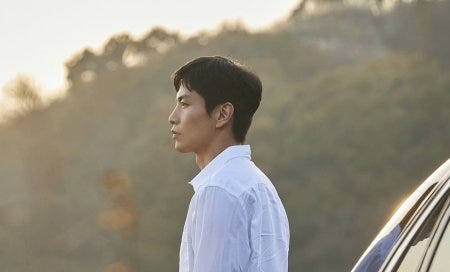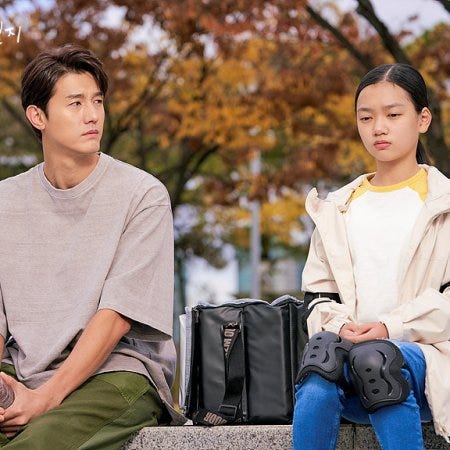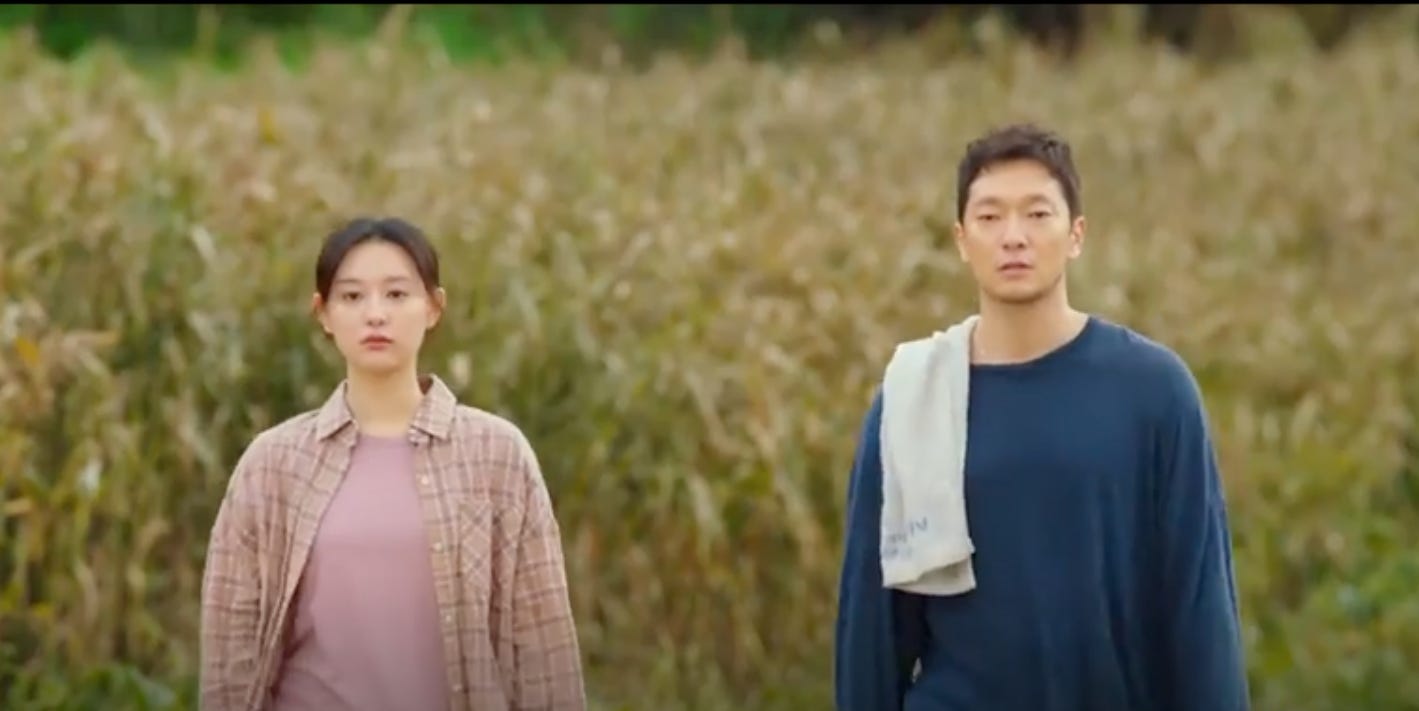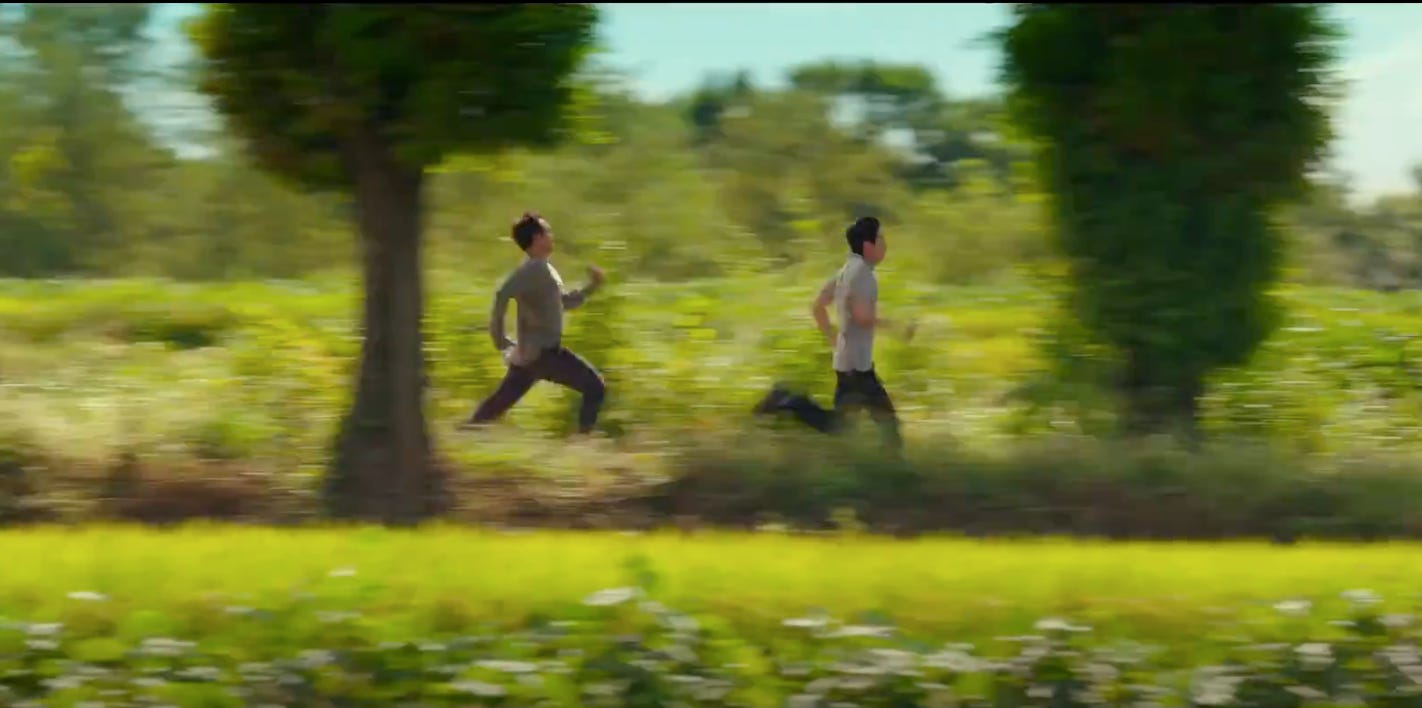Love is hard.
Hard to have and hard to hold on to. At least that’s what one concludes from the way the storyline unfolds. And as a stepping stone to the holy grail of happiness, love seems completely capricious. Indeed Gi-jeong would say that she’s never been happier Mi-jeong, after recent events, might say she’s never felt more miserable. All because of this little unpredictable thing called love. Chang-hee seems to have fallen in love too and it’s a sleek Rolls Royce. that’s caught his eye. Well, maybe it’s not the Rolls that’s providing the highs but what it offers him by way of freedom to get out of Sanpo at a whim. Freedom of movement has its perks though it does come with trade-offs. Furthermore, happiness gained through conspicuous consumption isn’t only transient but illusory.
While I’m barracking hard for the Yeom siblings to find true love in Princess Bride fashion, the drama is adamant that such a precious thing should not come easily. Tae-hun finally makes the call which sends Gi-jeong into flights of girlish glee. Her colleagues watching on the sidelines immediately advise her to make him wait which leads her to pose the question in genuine disbelief — why should she? The question shakes them both at their core. Why play hard to get? If two people like each other, why play this ridiculous game of confected push and pull? Because it’s the done thing, so they tell her. Thankfully she blythely ignores them and the two have their first date together in a popular, low-end eatery. Tae-hun informs her that there’s been a last minute cancellation and they’re fortunate to be next in line. The entire scenario is a fascinating parallel of their romance: uncomplicated and noticeable by a complete lack of fanfare. Just a mature-age couple getting to know each other over drinks and food after work. They could be anyone sitting in any restaurant in Seoul. She’s been openly besotted with him from afar and for him to take the trouble of finding a space that’s out of his sisters’ inquisitive reach shows that he’s given this some thought. Tae-hun is keen to date and for some reason he is attracted to the idiosyncratic Gi-jeong who rambles on unfiltered. Tae-hun is clearly amused and the two connect better than one might expect if first impressions are anything to go by. Later Yu-rim, his daughter wants to know what her father sees in this ahjumma. His answer, like the way he thinks, is commonsensical: Gi-jeong puts him at ease and seems to be fine with the way he is. In fact, he likes this ahjumma so much that he persuades her with shy sincerity not to shave her hair but choose him as someone she can fall in love with instead.
Yu-rim is palpably relieved for her dad as the dark cloud over her eyes lift but her more short-sighted aunties seem to think that disaster has befallen the family. Perhaps it has for them and their seemingly well-ordered existence that revolves around their niece. Their overreliance on Yu-rim for their happiness comes across as a more than a little troubling. They credit her for keeping them honest and make plans to live with her elsewhere if God forbid, Tae-hun should ever consider abandoning the good ship and remarrying. To the outsider looking in it seems premature to be raving on about changing real estate when their brother has only been out on one date. Still it must be mind blowing for Hee-sun and Kyung-sun that Tae-hun has drawn the demarcation lines so firmly and so soon in this relationship that he’s telling Kyung-sun to stay in her lane.
They are a second set of siblings with same composition. Two women and a man. Except instead of living with the older generation for continued financial support, they live with a child whom they rely on as their emotional or even moral anchor. Circumstances might have once forced them all to live under one roof at one point in the past but the routine is now being perpetuated with expectations that what has been will always be..
It begs the question as to how the Cho sisters see themselves. For the love of Yu-rim, they seem content to remain single for the rest of their lives. So they say. Scepticism might be warranted in this case as people in this show say a lot of things they don’t mean. Words can easily be used to conceal as much as they reveal. Moreover, living for another human being has the appearance of virtue and nobility that could also serve as a convenient excuse not to have to venture outside of one’s comfort zone. That word worship springs to mind again because the stated raison d’etre of the aunties. Idolatry is another because no human being should be this responsible for other people’s flourishing. Nor are they capable of being so. Playing surrogate mothers obviously has much appeal because they strangely assume that if Tae-hun were to remarry, that he would ditch Yu-rim in favour of new arrangements. It’s not him they fear losing but access to their niece which has become an entitlement. Hence, the reflexive push back on the disruption of a familiar routine.
Change is undeniably hard.
Perhaps attendance at the Liberation Club has rubbed off on Tae-hun. When Kyung-sun rocks up and threatens to interrupt a nice evening with Gi-jeong, Tae-hun demands that she leave. More politely than I would have been. It isn’t just that he’s clearly capable of standing up for himself but this gesture demonstrates his unwavering commitment to this new dynamic. Gi-jeong too seems dedicate enough to pose the question: What tips would he have for a woman dating a single man with a child? It’s a nice pre-emptive strike which demonstrates Gi-jeong’s repentant state. This change of heart signals a desire to accommodate and negotiate because the man with all the baggage attached is worth the effort.
In another part of the story, Gu announces his departure abruptly and promptly takes off in the Rolls Royce much to the disappointment of almost everyone but especially Mi-jeong. His past is an intrusive force that poses imminent danger to the family in Sanpo. Of course he wants to stay. Of that I have little doubt. Even Dad senses a likely successor in him. However, his whiny fellow gangbangers now making housecalls are a pesky persistent presence buzzing in the background because their status in the organization depends entirely on Gu being around. The onus is put on him to to keep them gainfully employed. Idolatry here is a noose around Gu’s neck despite the veneer of adulation from his subordinates. Therefore it’s a mixture of cajoling, veiled threats and pestering that sends Gu back to Seoul in time to attend a funeral of a much dested rival when he would clearly rather be sawing wood, bundling shallots and making googly eyes at Mi-jeong. The man certainly left his heart in scenic Sanpo.
Chang-hee offers Da-yeong, a colleague who has a thing for him, a ride in the Rolls but another vehicle parks him in. They wait around in awkward anticipation and he calls the number provided to no avail. After a while she leaves in disappointment and the owner of the offending vehicle returns soon afterwards intoxicated. The moral seems to be that Da-yeong, who is absolutely ready and willing, is clearly not the one to kiss in the car. Then who is? Hyeon-A? The childhood friend that has a dying boyfriend languishing in a hospital bed curious about why Hyeon-A constantly talks about Chang-hee.
Much is made of the urban-rural divide. The Yeom siblings resent the commute and stew over the fact that they’re made to feel the shame of living in a place nobody in Seoul can point to in a map. But… but… but… Seoul with its promise of greater prosperity and a much bigger sea of fish has been largely disappointing. Quantity hasn’t been quality. Mr Gu in a bid to escape gets off the wrong stop and ends up in Sanpo to romance Mi-jeong. Tae-hun is a Sanpo middle school alumnus. Hyeon-A born and bred in Sanpo revels in the freedom of Seoul and the dazzling array of choices that the big city offers but deep down she longs for something of lasting significance that eludes her in Seoul. Does she have latent feelings for Chang-hee? The Yeom siblings can’t escape the Sanpo connection wherever they go it seems.
As Chang-hee and Gu undertake the Great Sanpo to Seoul Chase, I was reminded not only of Forrest Gump but a podcast I once listened to about a man who reversed his depression in part through long distance running. It also reminds me that there is something always visually metaphorical about watching someone run. As much as it is a picture of a person running away from something, he/she is also running towards something on the other end. Chang-hee evades Gu to end up in a hospital in Seoul to see a stranger he’s only heard about from Hyeon-A. Gu finds his way to his old haunt where he tells a story about a company rival that’s been dealing drugs. His lackey gets the message and calls the cops on said rival. This signals Gu’s return to the world he escaped from and for Chang-hee, it may foreshadow new developments in his relationship with Hyeon-A, providing valuable insight into why Hyeon-A up to this point has never enjoyed the kind of stable relationship she’s been craving for all this time.








This is a lovely bit of writing, you always find the right words to my jumbled thinking.
I'm really happy I started watching this show. There's always so much to think about after watching it.